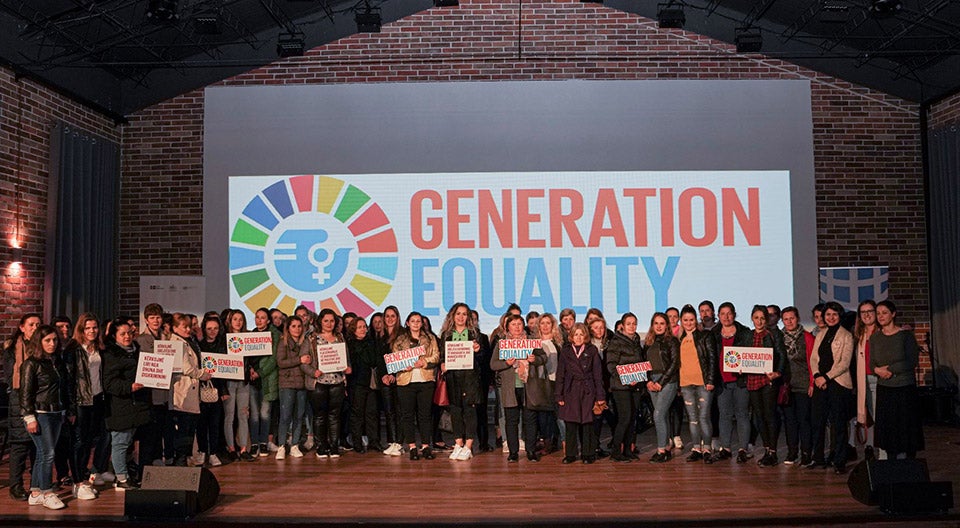Op-ed: 25 years of women’s rights - the promise that we must keep
Op-ed by Michele Ribotta, UN Women Representative in AlbaniaDate:

Many Albanians probably remember 1995 as the year when the war in the former Yugoslavia ended, Albania entered the Council of Europe, and Sony launched its first PlayStation. Perhaps not as many recall that 1995 also marked a historic turning point in the lives of women and girls around the world. It was right then that seventeen thousand activists gathered from 189 nations, including Albania, and unanimously adopted the path-breaking Beijing Declaration and Platform for Action, which to date continues to represent the most comprehensive and transformative global agenda for the empowerment of all women and girls and the key global policy document on gender equality. Delegates at fourth World Conference on Women envisioned a world where all women and girls have the right to live free from violence, go to school, earn equal pay for equal work, and have a seat at the decision-making table. Through the Platform for Action, countries made comprehensive commitments for change in twelve critical areas of concern, such as human rights, the economy, power, the environment, health and education, and more.
25 years later, as much has been achieved for women’s rights, we are still far from realizing the promise made in Beijing. No country in the world has achieved gender equality, we see painfully slow progress or even worse, pushback. Global figures show that less than two-thirds of women are in the active labour force, and nearly 400 million live in extreme poverty; 243 million women are victims of violence from an intimate partner each year; 190 million women are still unable to avoid unwanted pregnancy, the same as in 2000. Men hold 75 percent of parliamentary seats and 73 percent of managerial positions; 70 percent of climate negotiators, and almost all peace negotiators, are men.
Albania has made very important headway over the years, adopting laws and policies to protect women from discrimination and violence, support their access to health care and education, and participate in the economy. The Laws on Gender Equality, on Protection from Discrimination, on Measures Against Violence in Family Relations, as well as the National Gender Equality Strategy brought the country more firmly in line with international normative standards. The introduction of gender quota in the electoral system strengthened women’s political representation, with Albania currently featuring among the top five countries in the world for gender parity in Government.
In many respects, 25-year-old Albanian women today live a better life and have more opportunities than their mothers. However, much remains to be achieved. While women enjoy greater opportunities in education, with twice more girls than boys graduating in the last decade, they are often unable to transform education in sustainable employment, as also confirmed by the 15 percent employment gap. Albanian women do, on average, eight times more unpaid care and domestic work than men, negatively affecting their career and economic security. As they benefit more from social protection and health care, disparities persist among vulnerable women, depending on their race, socio-economic level, place of residence, age, or gender identity. As we see more women in leading roles, men continue to dominate the world of work, occupying, for example, 75 percent of administrators’ seats. Gender based violence remains a severe challenge: despite efforts from various parts, too many Albanian women live their life in fear, with one in two women having experienced violence at least once in their lifetime. Moving forward, implementation and resourcing of existing legal commitments should be prioritized, including more and better protection services for survivors of violence, coordinated by a fully functional National Referral Mechanism as well as society-wide education and prevention efforts including work with men and boys.
Existing inequalities were exacerbated by the COVID-19 pandemic, threatening to disrupt progress towards gender equality. The Rapid Gender Assessment conducted by UN Women during the lockdown showed that self-employed women in Albania in the 45-54 age group were hit harder (66.7 percent) by reduced work. Women continued to shoulder the bulk of unpaid care and domestic work: when schools shut down, unpaid care responsibilities grew, and with little access to affordable childcare, many women saw their job opportunities stifled. A surge in cases of domestic violence was reported, confirming the urgency to ensure funding and full accessibility of support services for survivors. Socio-economic support packages to counter the effects of the pandemic should address the specific needs of women.
Today, the UN General Assembly will convene a High-Level meeting to mark the 25th anniversary of the Beijing World Conference on Women. The event provides a great opportunity for world leaders to present concrete actions and commitments to ensure the full implementation of the Platform for Action. The world is not on track to achieve the sustainable development goal of gender equality and the empowerment of women by 2030. We need to accelerate progress, making full use of the best contributions that are available in public institutions, grassroot organizations, the academia, and the private sector, so that our generation can truly become Generation Equality.